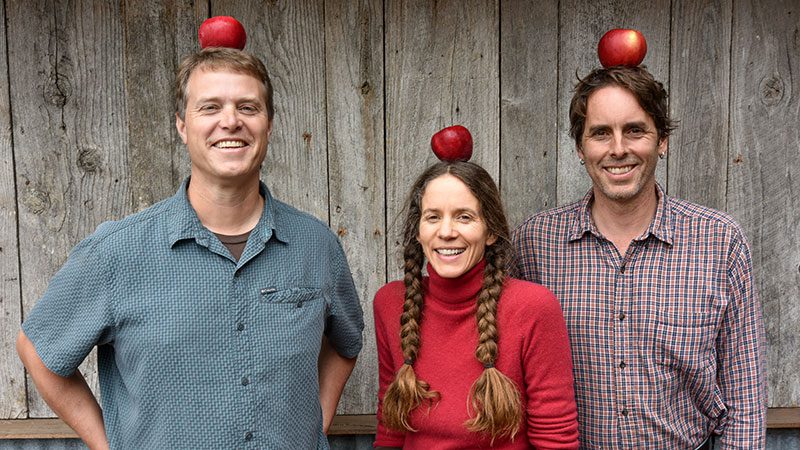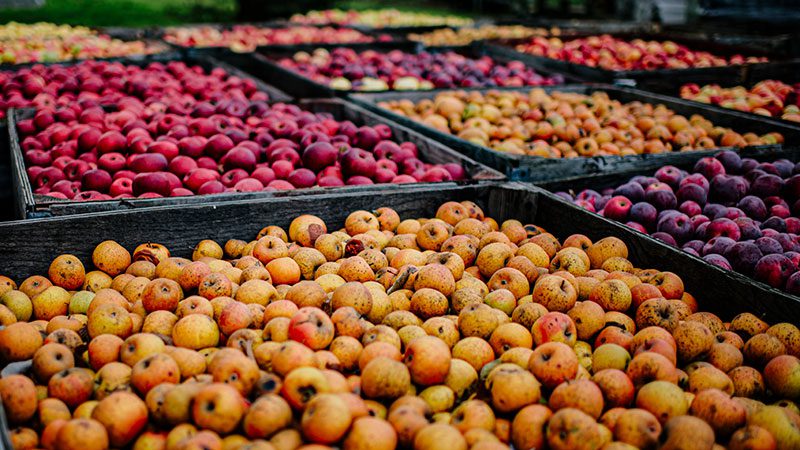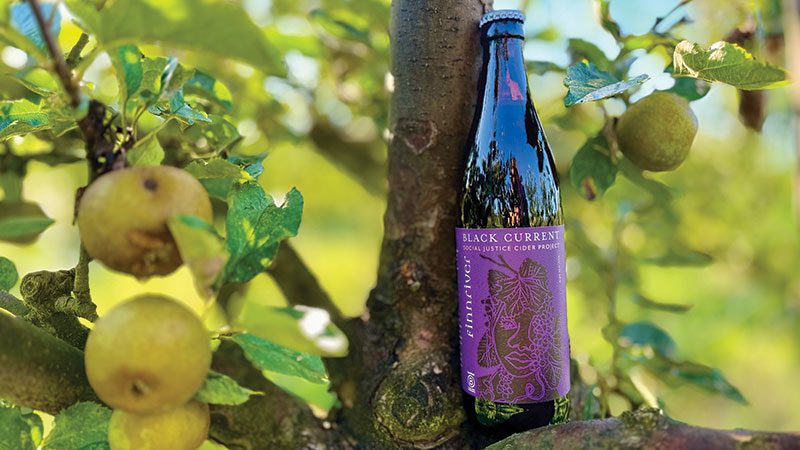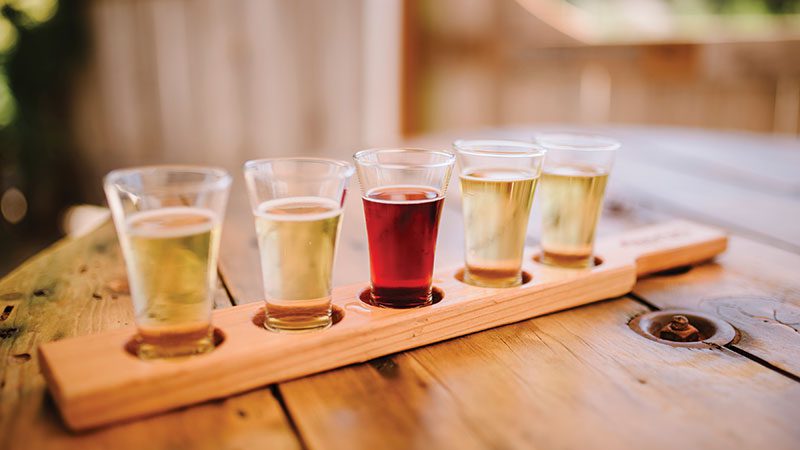Finnriver Farm

PCC’s mission is to ensure that good food nourishes the communities it serves, while cultivating vibrant, local, organic food systems. We’re proud to partner with organizations throughout the region and share their stories. One is Finnriver Farm and Cidery, a 50-acre organic farm and craft cidery on the Olympic Peninsula. Among its many endeavors supporting land and community, the certified B-Corp runs a “Social Justice Cider Project” supporting grassroots BIPOC (Black, Indigenous, People of Color) organizations “working for justice, healing and liberation.” PCC stores are currently the only retail outlet for the ‘Black Current’ and ‘Pera de Campesino’ (Farmworker Pear) Social Justice Ciders outside of the cidery and its farmers markets. Two dollars from the sale of each bottle go to featured organizations. Rachel Tefft, PCC’s Senior Manager, Community Food Systems, recently talked with Crystie Kisler, one of Finnriver’s co-founders. A condensed, edited version of their conversation follows:
Q: Can you tell us a little about Finnriver and how you got started?
A: Finnriver was rooted in a vision of reconnecting community to the source of our sustenance. It originally came from the marriage of an educator and a farmer. My husband Keith and I had met doing environmental education in Yosemite National Park in the early ‘90s, where we taught children about the relationship to nature in the wilderness. Keith was raised on a fifth-generation family farm in Eastern Washington, and he and I were noticing that there was a real disconnect between the conversation about Nature and the conversation about food. Now, several decades later, it is pretty well integrated, but at the time, it was not — and in fact, the food we were feeding the students was completely denatured. We started asking questions like, “Hey, isn’t our experience of eating every day another opportunity for us to connect to the land?”
I ended up getting a teaching degree and did my Master’s on school gardening, and I discovered the obvious thing, which was that my students loved getting outside, they loved leaving the building and working together to create something purposeful, whether or not they all became avid gardeners. There was this experience of having them involved in gardening that was just so physiological and somatic, and that sparked a lot for me.
Keith and I later moved out to the Olympic Peninsula and dreamed and schemed for years until we were able to purchase an organic farm in Chimacum, which we named after our toddler River and our land partners’ (at the time) son Finn. Later, we teamed up with our teacher-neighbor Eric Jorgensen to start the Cidery. We did it with very creative local financing, we did it with a very, very scrappy economic scenario. And it drove us to be really experimental, trying to find a model that would allow us to sustain this purchase that we had made. A number of remarkable things converged to help us get going — a great partnership, a land conservation project with Jefferson Land Trust, and a ton of community support for local, organic agriculture.

Q: What drew you to cider?
A: Each co-founder has a different pathway to cider and, for me, while the connection between food and Nature was obvious, I hadn’t made the same leap to beverages. I had disassociated alcoholic beverages from that kind of thinking, until my husband started to experiment with making cider and I saw the pathway from soil to tree to cider press to bottle and realized the connection was absolutely there.
As we started to put squeezed fruit in a bottle and pour it out for people, I could see (that realization) wash over them. There’s a little glitter that happens in drinking 6.5% cider that is very much in the lineage of human ceremonial tradition, this alchemical transformation.
It was all very tactile. Because we started so small scale, it was all still hand squeezed. You know, we started really scrappy- “Let’s put a small tank on the credit card. Let’s borrow a cider press from someone down the road.” Our scrappiness allowed us to recreate 10,000 years of fermentation history in the course of establishing our business. Going through those stages was really foundational to who we are and how we think. We loved that cider was a “new old thing,” in that it had a deep history in many cultures but had been sort of lost to time in the US. We had the joy of rediscovery and the excitement of reintroducing people to the possibilities of the fermented apple!
So I had my own reconnection and discovery and we thought, Let’s use cider to help people make this connection back to the land through drinking it in!

Q: Can you tell me more about your Social Justice Cider?
A: The Social Justice Cider project is an opportunity to share resources and tell important stories and generate positive energy around great work in social justice. The Finnriver mission statement is “Celebrate the beauty and bounty of the Earth, reconnect people to the land that sustains us and grow community.” I’m very proud to say that this mission has tracked from the minute we wrote that, which was early on, to now. It’s really held constant and steady and relevant. But while that line, “grow community”, is an easy thing to say, what happens when you interrogate that? What does that really mean? Who is included when you say ‘grow community’, and who’s not included, for reasons that you have or have not considered? That inquiry set the stage for this work that we started to do with the social justice cider project.
Practically, we take two of our most popular release — the Black Currant and Pear ciders — and we re-name and re-release them at a higher price and with special label art commissioned for the project and to amplify the impact. As “Black Current” and “Pera de Campesino,” these bottles become ambassadors for great BIPOC-led projects and help redirect resources. To date, we have featured over ten organizations on this labels, redirecting thousands of dollars to creative and transformative work in social justice.
Being true to our mission and to our B Corp status requires that we consider people, planet and profit and the certification helps hold us accountable. But it feels like our real relationships are the best accountability.
Q: How do you select the project partners?
A: We look towards grassroots efforts as well as more formal organizations because some of the feedback that we got early on about movement, justice and community work is that it’s not only found in the non-profit sector but also in artists and other community and grassroots groups. We wanted to be able to pass resources along to these groups that often needed support and don’t receive it through typical non-profit channels, at the moment where they’re just forming or they’re forming in a way that’s revolutionary and that we need to encourage.
We also want this project to be rooted in real relationships so many of the project partners have been folks we’ve met through events and community networking, or folks who have come to visit, perform or practice their work.

Q: Something unique about this program is the way that everyone contributes to it. Can you say more about that?
A: Eric wanted to be really thoughtful about this and make sure that we were not just passing the markup to the consumer, but that the business and our retailers were all contributing. The price for Social Justice Ciders is $1 higher than standard retail pricing, and 100% of that extra dollar will be donated to the featured endeavors and organizations. Finnriver and PCC match this by adding a second dollar, 100% of which will also go to the featured projects.
Q: What challenges have you faced?
A: This work is not just a marketing gimmick; and not being performative requires us to be in real relationships. We’re trying to challenge this idea that we can just move some money around and think that we’ve done our part. And I think what I’ve had to learn again and again, personally and on behalf of the company, is that one of the biggest parts of relationship building is committing the time, showing up ready to learn, to be challenged and to change. This means it’s about opening our hearts, and changing our minds, more than just a transfer of resources.
Another challenge is balancing the needs of the business with the commitment to community work. A critical part of being in business in our rural community has been figuring out how to make adequate and meaningful livelihoods for our employees and their families. Even as we commit to social purpose, we also have to make sure that we’re not undermining our ability to remain viable.
The question “Can you use business as a force for good?” is our daily challenge.
Discover Finnriver’s Social Justice Cider
Head to your local PCC and look for Finriver’s social justice ciders in the beer, wine, and spirits department.
Find Your PCC